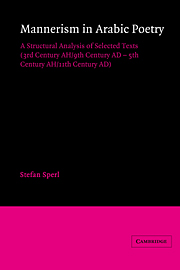 Mannerism in Arabic Poetry
Mannerism in Arabic Poetry Summary
‘Die Sprache als Sprache zur Sprache bringen’
(Heidegger, 1959, p. 94)Two mimetic processes
Most recent discussions of mannerism in literature have drawn attention to the prominent role played by techniques and conventions of literary language in mannerist style. This feature has repeatedly provided the reason for its condemnation. In his discussion of Italian baroque lyric, H. Friedrich remarks that ‘the aims of expression and representation of artistic language recede in the face of a dictatorship of linguistic artifice’ (1964, p. 564); he notices a ‘shift of emphasis from colloquy of objects to soliloquy of words’ (ibid., p. 563), and concludes that ‘language and content, nay, language and world, no longer converge but diverge’ (ibid., p. 558).
H. Friedrich's theories inspired J. C. Bürgel (1965, pp. 235ff) and W. Heinrichs (1974) in their search for a meaningful application of the term mannerism to Arabic literature. Heinrichs resumes Friedrich's observation of a dichotomy between signifier and signified; he abandons, however, the latter's negative bias and tentatively describes mannerism as ‘a possible and legitimate “Grundform” of poetic expression’. The core of his definition is as follows: ‘The correlate of mannerist poetry is not reality but literature, i.e. language formed and formalized. The resulting effect is, so to say, one of language at play, or, as Friedrich says, an “ignition of language from within”. Parallel to this, the representational character of language becomes increasingly insignificant’ (ibid., p. 128).
Heinrich's definition posits two contrasting mimetic processes – presumably the same intended by Friedrich's distinction between ‘colloquy of objects’ and ‘soliloquy of words’. Reality as correlate of poetry, or ‘colloquy of objects’, suggests a form of mimesis intent primarily on the fashioning of reality as dictated by, and in accordance with, poetic convention.
- Type
- Chapter
- Information
- Mannerism in Arabic PoetryA Structural Analysis of Selected Texts (3rd Century AH/9th Century AD – 5th Century AH/11th Century AD), pp. 155 - 180Publisher: Cambridge University PressPrint publication year: 1989


